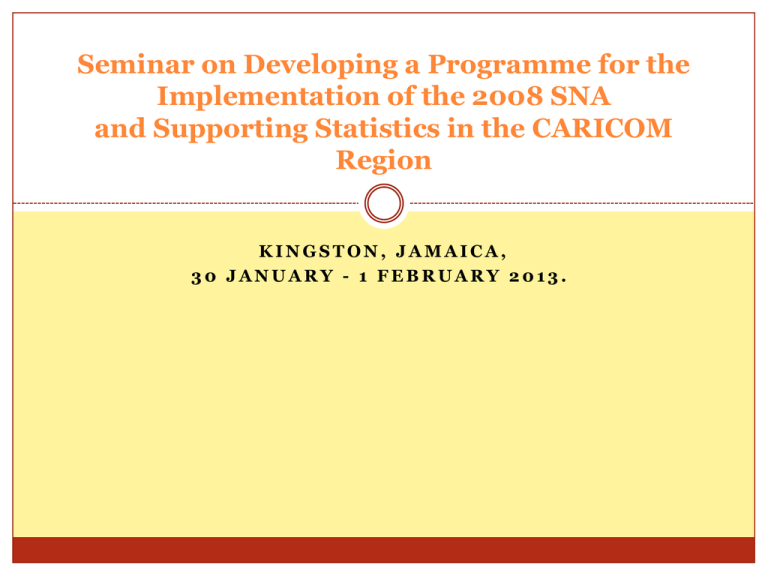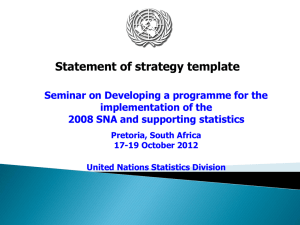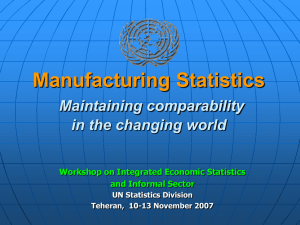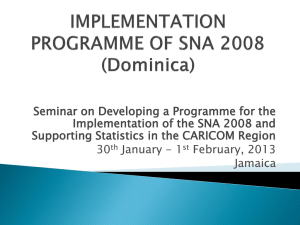Seminar on Developing a Programme for the
advertisement

Seminar on Developing a Programme for the Implementation of the 2008 SNA and Supporting Statistics in the CARICOM Region KINGSTON, JAMAICA, 30 JANUARY - 1 FEBRUARY 2013. Presentation on the implementation of SNA 2008 in Trinidad and Tobago Dave Clement Director of Statistics Central Statistical Office Trinidad and Tobago Overview Country Experience Classifications in Use Business Register Base Year Revision Short-Term Economic Statistics ISIC Rev. 4 Overview Supporting Systems –SUT; Informal Sector Establishment & Administrative Surveys Re-design of Survey Instruments Central Bank implementation of BPM6 NSDS and Infrastructure Development Towards Implementation of SNA 2008 R&D; Weapons systems; Money Lenders Restructuring of the CSO Country Experience in National Accounts Consistent and continuous series compiled since 1966 Three National Accounts Reports with consolidated accounts of the nation published PUBLISHED NATIONAL ACCOUNTS REPORT SERIES: 1951-1954; 1951-1959; 1951-1961; 1952-1962; 19661985;1983-1987; 1981-1991; 1990-1994; 1990-1996; 1995-2001; 2000-2005 Last revision of constant price base year done in 2002 with base year 2000=100 National Economic Accounts prepared in the Nat. Econ. Accounts Division one of four (4) subject matter divisions of the CSO T&T economy divided into 20 sectors using a classification system that is not derived from ISIC in that it does not follow the ISIC structure but is related to the ISIC and can be reorganised into ISIC through a Correlation Table (Table of Equivalence) Classification in use TTSNA departs from ISIC in material respects Departure was deliberate Highlighted the peculiar structure of the T&T Economy open, petroleum based economy, which dominated economic performance exports sales, government revenue, capital expenditure, foreign exchange earnings etc. Recognised vulnerability of economy to external shocks Needed to monitor dynamic changes in the sector TTSNA consolidated all Petroleum and subsequently Gas related activities into one economic activity sector (combined ISIC energy activities of Exploration and Production, Refining, Distribution and also included service activitie related to the activities mentioned) The traditional character of agricultural production resulted in separation of activity into Export and Domestic Agriculture Manufacturing activities were disaggregated into sectors of economic activity meant to highlight the assembly line like nature of domestic production Other deviations also pursued in health and education, and the services particularly personal services Business Register System recognised the importance of maintaining an up to date register of business establishments and established a Unit adequately staffed (at the time) for continuous maintenance of the sampling frame. Business Register Unit sourced information from any available source and Pre-surveyed establishments before classifying to sector. Base Year Revision There have been periodic revisions of the Base Year for development of constant price series Base Year Revisions have not been scheduled or caused to happen, in response to fundamental changes in economic structure and the periodicity has been compromised by non-technical issues including human and financial resource constraints. There is sufficient evidence to suggest that a revision of the base year and constant price series is overdue. Short –Term Economic Statistics Indices of Domestic Production are produced Quarterly. Indices of Producer Prices are produced quarterly Index of Retail Sales produced quarterly Index of Retail Sales of Building Materials produced quarterly. Trade Statistics produced according to monthly reference. Indices of Average Unit Value of Imports and Exports produced Quarterly. Index of Retail Prices/ Inflation Rate produced monthly. A Rebased Index with revised weights and indicator items will be released in 1st Qtr. 2013 with base year September 2012 = 100 Short –Term Economic Statistics cont’d. All indicators are currently being produced with dated base years. Domestic Production and Producer Prices Indices under revision, progress interrupted. Revision of the Index of Retail Prices close to finalisation. ISIC Revision 4 Revision of derived (TSIC) and related (TTSNA) national classifications about to commence ISIC Correspondence table to be updated. Revised classification to be applied to updated establishment frame (based on 2011 Population and Housing Census). Revision should be completed by 1st quarter 2013 Data also needed for industry classification for the 2011 Population and Housing Census. Supporting Systems Compilation of Supply and Use Tables A balanced SUT was produced for 2000 Capacity Building efforts with Technical Assistance from CARTAC to update for 2005 was affected by staff turnover and staff re-assignment. This is a high priority exercise which will probably now be compiled for a more recent year (maybe 2010 or 2011) Informal Sector Measurement Official measurement methodology needs to be articulated. Dedicated resources must be allocated within the system for continuous measurement Quarterly GDP Trinidad and Tobago has applied for subscription to the IMF’s SDDS Compilation of QGDP is a pre-requisite for subscription Staff were recruited , trained and subsequently left on two ocasions. Work has temporarily halted until the human resource situation is resolved . QGDP has high priority in the work programme. Data Sources – Establishment Surveys Establishment Surveys are conducted Annually Establishment Non-compliance and staff turnover affecting follow-up have contributed to increased non-response rate. Scientific Sampling methodology of Business Establishments will be re-introduced in 2013. VAT data previously available at the establishment level no longer available. This has been a serious setback in preparing Annual GDP estimates. Other Data Sources Data are also sourced from Administrative records Surveys of other Divisions of the CSO, including Agriculture Surveys, Household Budget Surveys, Economic Indicators compiled from monthly and quarterly surveys Data from other statistical sources in the NSS including Central Bank of T&T; Tourism Development Company; NIB; Registrar of Companies; Ministries and Departments of Gov’t.; Administrative Surveys CSO recently undertook an Administrative Survey exercise directed at all Government Ministries to identify potential data sources. Greater emphasis will be placed on mining administrative data. Data Mining competencies and Tools should be available to National Economic Accounts Division MoUs should be established with potential supplier agencies Survey Instruments SNA 2008 conceptual treatments and data requirements will require a careful and detailed review and re-design of survey instruments. Range of Custom-designed survey instruments currently in use will need to be expanded. Central Bank Implementation of BPM6 1 Expanding coverage of external sector to include for example mutual funds, pension funds, expanded data on services, directional FDI by country inward and outward. 2. Re-classification of items 3. Updated list of foreign owned businesses in Trinidad 4. Ongoing progress, have a 3-year action plan developed with the assistance of the IMF, and the process is ongoing on a phased basis. Towards Implementation of SNA 2008 Not yet scheduled in the work programme Base Year Revision and SUT compilation have been given greater priority Staff complement needs to be increased CSO must prepare another National Accounts report Discussion of proposed recommendations of the SNA 2008 and training of staff should be undertaken in advance of scheduling, at the earliest opportunity to appreciate the impact and changes needed. NSDS and Infrastructure Development Technical Assistance needed to develop NSDS Adequate, permanently employed graduate staff complement must be in place Automation of data compilation using tools like ERETES Major Training Investment required Significant IT Investment needed Resident Technical Assistance should be in place for an extended period. Bi-lateral donor support needed. R&D; Weapons Systems and Money Lenders Research and Development Is currently treated as an Intermediate Expense SNA 2008 recommends that it be treated as Capital Formation This will reduce Intermediates and increase Operating Surplus and Capital Formation. Forms will have to be amended Businesses will need to be informed of the treatment and the need to provide more detailed data. This will meet resistance because research and development is important to gain competitive advantage and there will be concerns about information sharing. Weapons Systems Previously not considered, must now be considered particularly because of the war on drugs. Acquisition of these systems now a reality Serious challenge will arise to get the detailed information needed to properly allocate. Money Lenders Informal Sector for the most part Below the radar Data collection from the Money Lenders not likely to be forthcoming Access via Household Surveys such as HIES are possible Respondents may be reluctant to share Restructuring of the CSO Cabinet decided in Cabinet Minute No. 2934 dated 01 November 2007 to accepted the Final Report of the ICO of Statistics Sweden, for the restructuring of the CSOTT. Cabinet recommended inter alia: Establishment of a NSS which covers producers and users of statistics, data suppliers/respondents, research and training institutions and their interactions in the provision of data. Establishment of a NSO to be the main national body in charge of the development and management of national statistics that will be a professionally autonomous institution with executive agency status. Establishment of a Board, an Advisory Council and a new legal framework which authorizes the required institutional framework. Restructuring Programme of Work Transformation and performance improvements within the current organization and structure. Review of Draft Regulations and Statistics Act by major stakeholders. Consultancy for the Definition of Supply and Demand/Design of Core Products and Processes (ToR developed Statistics Sweden being pursued for this work stream). Current State Human Resources Management ( Management and Planning and Preparation for Change by addressing management practices and human resource issues). Statistics Sweden will submit its report in Feb 2013. The report will make recommendations for the way forward to the restructured CSO. Semi-autonomous body outside of the Public Service New Statistics Act



